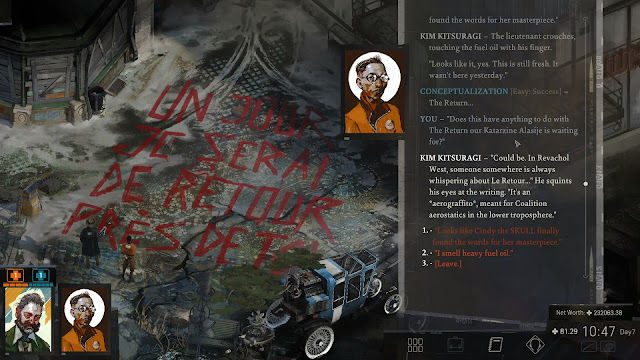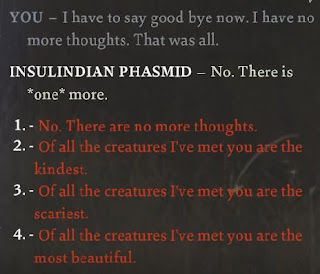Further Thoughts On Disco Elysium
- Avi Margolis

- Jan 26, 2022
- 4 min read
This post contains spoilers for Disco Elysium.
Disco Elysium is a game which has haunted me since I first played it. It is a game which raises many questions and answers only a few of them.
On a recent playthrough, I learnt about a phenomenon known as The Return. The belief many of those who live in Revachol (the post-failed-revolution city where the game is set) secretly harbor, that one day, perhaps even soon, the good old days will return. An elderly man who once served in the communist militia tells you that he waits in hiding for the return of Girl Child Revolution. Another, who served in the old king’s army before the communists killed him, waits for the return of the rightful monarch. A young woman on the run from her past begs you not to arrest her. Give her a station call slip and she will bring herself in, she promises, in her own time. Perhaps in a month or two things will be different. Perhaps she can be tried in a free Revachol, by a jury of her peers and not the corrupt international government which currently occupies the city of Revachol as a Zone of Control.
Disco Elysium is a game about longing, and particularly political longing. Everyone everywhere is waiting for something. They are waiting for the wheel to turn, for the other shoe to drop, for their moment to strike. Everyone in Revachol waits. Very few of them act.
Graffiti is prevalent throughout the game, which takes place in the poor, run-down district of Martinaise. A young woman who goes by “Cindy, the Skull” will be met painting a bright red skull on an apartment wall. If you read through your police ledger for old cases you can learn about “THE NEXT WORLD MURAL” a case where you investigated who had painted a mural of a man and a woman kissing with the text: “True love is possible only in the next world — for new people it is too late for us. Wreak havoc on the middle class.” You read about the plebiscite you participated in deciding what to do with the mural. When you read your case notes, you, the player, can choose whether the conclusion was to leave the mural up or take it down.
Finally, on the last morning of the game you wake up to find a message in red paint scrawled on the ground of the plaza, where blood still remain from the game’s climactic gun fight. It reads “Un jour je serai de retour pres de toi.” One day I will return to your side. The game will point out that letters are large enough to be read by Coalition airships flying overhead. A message to them about the coming of Girl Child Revolution? A message to you about your lost love? You can ask your partner, Kim, whether this refers to The Return and he will tell you it is very possible.

These graffities capture the mood on the street, the spirit of Revachol, the desire for something better. And yet, Revachol has been under Coalition rule for 50 years. Change feels nearly impossible. But something happens. As you solve your case and unravel the strange workings of the city. You discover that there is agitation and discontent and action, bubbling below the surface of the city along side the revolutionary-era weapons caches.
One of the major quests in the game involves bargaining with the union boss, whose workers will claim to have killed the murder victim you are investigating, and the company negotiator, who brought the victim, a mercenary for hire, into the city as part of her security detail. If you exhaust the dialogue between them, delivering messages and sharing their secrets with each other, you will discover that the murder aligns perfectly with the plans of the union boss, who has intentionally refused to speak with the company negotiator as he attempts to seize the harbor for himself. You find hints of this throughout the game as you sneak around the harbor and find the company branded shipping containers being painted over in union red. If you follow this path, the company negotiator will leave the city, considering the whole debacle to be too much bad press and choosing to give up on the harbor. A win for communism? The start of a movement? Perhaps. But just as easily a power grab from a corrupt union boss to become the new petit bourgeoise. Or even, the game hints, an opportunity for the Coalition government to swoop in against the communist threat and claim the harbor as their own.
In Disco Elysium you can begin to feel that every win is a loss. Every victory comes with a cost. Perhaps it is hopeless to dream of better futures. But the truth is that you have no other option. At every turn the game will show you the downtrodden, those who need help and care. They deserve a better world. They believe in a better future. Perhaps you can believe in it too. Perhaps you can bring it about. For them.
The game’s side quest of discovering a cryptid is one of the most poignant examples of the hope beneath all its cynicism and despair.
If you reach out to pet the newly discovered Insulindian Phasmid it will begin to talk to you, directly into your mind, no one else will hear it. It will tell you that you (you in particular or you as in humanity is left ambiguous) are a miracle. A violent and dangerous miracle whose existence has fundamentally altered reality. The phasmid understands your power to do great harm but also great good.
At the end, you are given a choice of how you wish to describe the Insulindian Phasmid, before you say goodbye.

I always pick kindest.




Comments